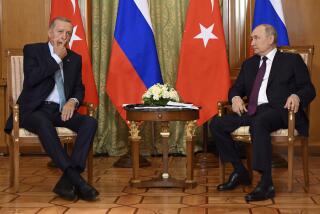Iran inches away from nuclear deal amid U.S. sanctions
- Share via
Reporting from TEHRAN — Iran’s president said Wednesday that it will stop exporting excess uranium and heavy water from its nuclear program as stipulated by the 2015 atomic accord and set a 60-day deadline for new terms to the deal before it will resume higher uranium enrichment.
Hassan Rouhani’s address to the nation came on the anniversary of President Trump’s decision to withdraw America from the landmark agreement. Rouhani said Iran wanted to negotiate new terms with remaining partners in the deal, but acknowledged that the situation was dire.
“We felt that the nuclear deal needs a surgery and the painkiller pills of the last year have been ineffective,” Rouhani said. “This surgery is for saving the deal, not destroying it.”
The 2015 deal saw sanctions on Iran lifted in exchange for limits on its nuclear program. After the U.S. withdrew from the accord it restored crippling sanctions on Iran, exacerbating a severe economic crisis.
Iran sent letters Wednesday on its decision to the leaders of Britain, China, the European Union, France and Germany via their ambassadors in Tehran. All were signatories to the nuclear deal and continue to support it. A letter also was given to Russia. Iranian Foreign Minister Mohammad Javad Zarif was to meet Wednesday in Moscow with his Russian counterpart.
“If the five countries join negotiations and help Iran to reach its benefits in the field of oil and banking, Iran will return to its commitments according to the nuclear deal,” Rouhani said.
However, Rouhani warned of a “strong reaction” if European leaders instead sought to impose more sanctions on Iran via the U.N. Security Council. He did not elaborate.
Zarif separately issued his own warning from Moscow.
“After a year of patience, Iran stops measures that [the] US has made impossible to continue,” he wrote on Twitter. World powers have “a narrowing window to reverse this.”
Rouhani also said that if the 60 days pass without action, Iran will halt a Chinese-led effort to redesign its Arak heavy water nuclear reactor. Such reactors produce plutonium that can be used in nuclear weapons.
There was no immediate response from the U.S. However, the White House said Sunday it would dispatch an aircraft carrier and a bomber wing to the Persian Gulf over what it described as a new threat from Iran.
Iran reached the deal with world powers in 2015. Western governments had long feared Iran’s atomic program could allow it to build nuclear weapons. Iran has always maintained its program is for peaceful purposes.
Under terms of the deal, Iran can keep a stockpile of no more than 660 pounds of low-enriched uranium. That’s compared to the 22,046 pounds of higher-enriched uranium it once had.
The U.S. last week ended deals allowing Iran to exchange its enriched uranium for unrefined yellowcake uranium with Russia, as well as it being able to sell its heavy water to Oman. The U.S. also has ended waivers for nations buying Iranian crude oil, a key source of revenue for Iran’s government.
Currently, the accord limits Iran to enriching uranium to 3.67%, which can fuel a commercial nuclear power plant. Weapons-grade uranium needs to be enriched to around 90%. However, once a country enriches uranium to around 20%, scientists say the time needed to reach 90% is halved. Iran has previously enriched to 20%.
More to Read
Sign up for Essential California
The most important California stories and recommendations in your inbox every morning.
You may occasionally receive promotional content from the Los Angeles Times.










